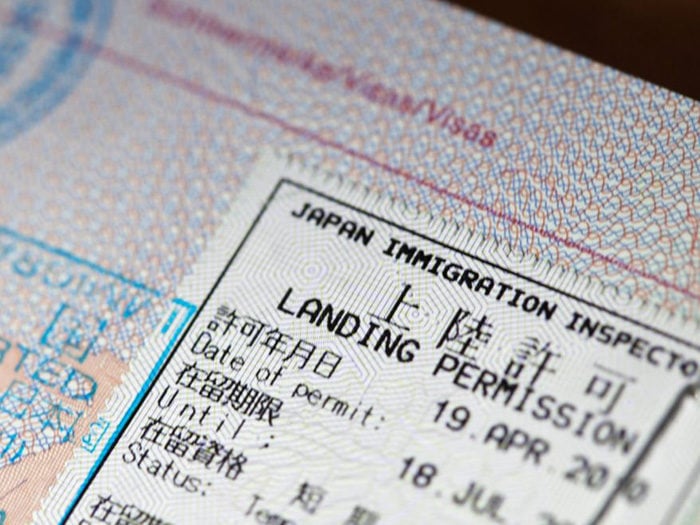
If you want to work in Japan as a foreigner you have to get a work visa, which can be a frustrating and confusing experience. Let me show you all the things you need to do to get a work visa so you can stop worrying and start living and working in Japan.
Who can get a work visa?
Anyone can get a work visa in Japan, but it varies in difficulty based on the country of origin, your skills, work and educational background, your connection to Japanese people (are you married to Japanese or a descendant of a Japanese national?) and sometimes just dumb luck. Visas can be rejected for a whole bunch of reasons that we might never know, as we are not given their criteria for deciding whether or not we can get the visa. However, for the most part, if you have an employer to sponsor your visa, it becomes much easier, and usually there are no problems.
There are a lot of categories for working visas in Japan, and applications for all of them are here on the Japanese Immigration website. However, hold your horses on clicking that link because you need to have an employer support your application if you want to even get to that stage. Check on the JobsinJapan.com board and search for a job with “Overseas Application OK” checked.
The first step for just about everyone is to get a Certificate of Eligibility (COE) so you can get landing permission to Japan.
How do I get a Certificate of Eligibility to get my visa in Japan?
Once you’ve been offered a job by your employer, you’ll get a bunch of information from them including what you need to send them for the paperwork. If you’re going to be teaching it’s common to require a criminal records check to make sure that you haven’t committed a crime in your home country, as you aren’t allowed to work with children in that case.
Once all of the documents are in order you’ll need to go to the nearest Japanese embassy to you in order to file the paperwork on your end officially. It usually takes several weeks for the COE to come through. You’ll get a letter in the mail asking you to come and collect your paperwork. Once you have received it you will get a window within which you need to arrive in Japan, or else the COE will become invalid and you’ll need to renew it. This usually takes anywhere between two weeks to two months, so make sure you apply in good time before you need to be in Japan.
What are my working restrictions in Japan?
The working visa for Japan is designed for you to have one full-time or a contract job. There is a lot of misinformation out there about doing multiple jobs or freelancing,
many of which are on the All-In-One Freelancing Guide on one of our partner sites, Live Work Play Japan. To cut a long story short, you cannot freelance on a standard working visa, and every job you take you will need to inform immigration or risk losing your visa if you don’t go through their procedure (and hope they say yes). This doesn’t mean that foreigners don’t do this and get away with it, but if you intend to renew your visa after the first 1, 3 or 5 year stint you get, it’s in your best interest to abide by the law of the country you live in.
If you don’t wanna get in trouble with immigration, you have to stick to one job and get a “permission to engage in other activities” form approved for any additional jobs.
What is the easiest job to get to Japan with a work visa?
While the most well known job foreigners come to Japan with is as an ALT on the JET programme, this isn’t the most efficient way to get to Japan. For one thing, applications begin in November to come to Japan for the following August. That’s a nine month wait! On top of that the JET programme is very competitive and even if you speak Japanese well there’s no guarantee that you’ll get past the screening process. It’s much faster and easier to find a job with a private company that supports a visa.

Teaching [English] is by far the most common job for foreigners in Japan.
If you go to the jobs board and look for jobs that support a visa, you’ll find jobs that are much easier and faster to get to Japan with than the JET programme.
What is the best type of work visa in Japan?
The answer to this question totally depends on what kind of work you want to be doing. The overwhelming majority of foreigners from the West coming to Japan will be English teachers, but depending on the type of job there are two broad categories of visa they will have. There’s the “Specialist in Humanities / International Services / Engineer” and the “Instructor” visas, and both have slightly different functions and purposes. If you are working at an Eikaiwa (conversation school), as an ALT or at a Juku (cram school), you’ll probably have a Humanities visa. If you’re working at a private school or as a main teacher in a high school, you’ll probably have an Instructor visa.
Specialist in Humanities / International Services / Engineer visa
The type of work you can do under this visa is: working as an engineer including software engineering, in legal or economic fields, in translation, interpretation, English or other language teaching, PR and advertising, and design fields like graphic design or fashion.
Instructor visa
Depending on the environment you work in you will need an instructor visa as opposed to the more common and useful Specialist in Humanities / International Services / Engineer visa. Usually the type of work you will need this visa for would be schools where you will be a teacher with more responsibilities, such as a classroom lead teacher at a junior high or high school, or a university instructor (depending on the position title you may need a “Professor” visa).
Can I work while studying in Japan?
If you are a student and you are enrolled in a university or language course (among others), you can get a part-time job (called arubaito in Japanese) as long as it doesn’t exceed a certain number of hours per week. You will need to get relevant permissions form immigration and sometimes your school as well.
Can I apply for a working holiday visa in Japan?
This really depends on where you are from and meeting the requirements set here. Each country participating in the working holiday visa program have a set number of applications they can accept per year (some have no limit), and if you tick all the boxes this is usually a simple process.
Unfortunately this isn’t a long-term solution for sticking around in Japan. As a general rule working holiday visas are intended to be a holiday first and foremost, and there are restrictions on the work you can do and how many working hours you can do it for. It’s a one-time visa and once it expires it cannot be renewed nor applied for again. It can be difficult for companies to sponsor a change of visa status for people who are in Japan on a working holiday visa.
Can I come to Japan as a tourist and change visa status to a working visa?

Coming to Japan as a tourist can become a chance to live here!
In some cases you can change your visa even if you come into Japan as a tourist, but the immigration authority is a little unclear about this. I have heard many stories about it and have a few friends who have found jobs while travelling in Japan. Some have told me that they were asked to apply from within their home country, and have had to leave, get the COE and then return after getting the proper clearances. Others have been able to change their visa from within Japan without returning, and it seems to depend on who you talk to at immigration offices.
The procedure for changing visas can be found at the government website here.
What should I do if Japanese immigration rejects my visa/renewal?
It’s uncommon but sometimes immigration will refuse a visa. They rarely give you a specific reason why because they don’t want to open up the possibility of an argument or discussion about it. They would just ask you to apply again and hope to get a different response.
In the case that your application is denied, we would recommend that you go to a professional to get help in making sure that your application doesn’t have anything that immigration would reject you for.
Do you have your work visa for Japan sorted? How did you get it, and have you had any troubles along the way? Share in the comments below.













